Why this resume works
- Highlights industry-specific skills: The resume showcases administrative skills like financial reporting, compliance management, and internal audits, indicating suitability for accounting positions.
- Quantifies accomplishments: Measurable achievements such as reducing errors by 15% and increasing profitability by $200,000 emphasize the candidate’s tangible impact on financial efficiency and growth.
- Showcases career progression: Clear career progression is highlighted from junior accountant to senior financial analyst to accountant, showing a steady increase in responsibilities and expertise.
More Accountant Resume Examples
Our accountant resume examples show you how to emphasize your financial expertise, attention to detail, and analytical skills. Use these samples to build an accounting resume that showcases your strengths and positions you as a top candidate in accounting roles.
Entry-level Accountant
Why this resume works
- Foregrounds education section: If you’re early in your career, placing the education section near the top of your resume highlights your most relevant qualification, especially if you have limited work experience.
- Starts with an objective statement: Resume objectives are ideal for entry-level candidates because they focus on career goals and enthusiasm, helping to compensate for limited work experience.
- Shows digital literacy: Proficiency with accounting software and financial systems indicates a certain number of computer skills, highlighting readiness for modern workplace challenges.
Mid-level Accountant
Why this resume works
- Hones in on real impact: Excels in demonstrating real impact by highlighting specific budget management achievements and cost savings, showcasing how these contributions add tangible value for employers.
- Demonstrates language abilities: Underscores language skills through mention of English, Spanish, and French proficiency, emphasizing the candidate’s ability to engage in cross-cultural communication and international projects.
- Displays technical expertise: Technical expertise is prominently displayed with references to CPA, CMA, and CFA certifications, as well as key financial skills like auditing, tax preparation, and financial analysis.
Experienced Accountant
Why this resume works
- Lists relevant certifications: The resume lists Certified Public Accountant and Certified Management Accountant, reflecting the candidate’s specialized expertise and commitment to ongoing professional development.
- Showcases impressive accomplishments: Highlighted achievements like reducing audit discrepancies by 30% and saving 40 hours monthly through software implementation underscore the candidate’s significant impact at a senior level.
- Focuses on work history: A chronological format emphasizes extensive work history, detailing roles from junior accountant to senior financial analyst, ideal for showcasing long-term career progression.
Accountant Resume Template (Text Version)
Min Miller
Riverview, FL 33583
(555)555-5555
Min.Miller@example.com
Professional Summary
Detail-oriented accountant with 8 years in financial management. Expertise in financial reporting, budgeting, and enhancing internal controls. Proven success in reducing costs and improving compliance.
Work History
Accountant
Prime Financial Solutions – Riverside, CA
January 2022 – March 2025
- Managed accounts payable and receivable, reducing errors by 15%
- Prepared monthly financial reports and forecasts, enhancing accuracy
- Implemented internal audits, improving compliance by 20%
Senior Financial Analyst
Eagle Investments Inc. – San Francisco, CA
January 2019 – December 2021
- Analyzed financial data, increasing profitability by 0,000
- Led budgeting process, maintaining variance under 5%
- Developed financial models, supporting strategic planning
Junior Accountant
Metro Business Solutions – Riverside, CA
January 2017 – December 2018
- Assisted with financial statement preparation, ensuring accuracy
- Reconciled bank statements, reducing discrepancies by 10%
- Supported audit activities, enhancing internal controls
Skills
- Financial Reporting
- Budgeting & Forecasting
- Accounts Payable/Receivable
- Internal Audits
- Financial Analysis
- Compliance Management
- ERP Systems
- Microsoft Excel
Education
Master of Business Administration Accounting
University of Texas Austin, Texas
May 2017
Bachelor of Science Finance
Texas A&M University College Station, Texas
May 2015
Certifications
- Certified Public Accountant (CPA) – Texas State Board of Public Accountancy
- Certified Management Accountant (CMA) – Institute of Management Accountants
Languages
- English – Beginner (A1)
- Spanish – Beginner (A1)
- French – Intermediate (B1)
Popular Skills for a Accountant Resume
Including a robust list of skills on your resume is essential for an accountant, as it highlights both the technical expertise and your personal attributes.
Below are a few of the top soft skills frequently listed on accountant resumes by MyPerfectResume users.
| Soft Skills | % of resumes with this skill |
|---|---|
| Customer relations | 19.39% |
| Strategic planning | 1.35% |
| Superior attention to detail | 1.24% |
Here are a few examples of hard skills frequently included on accountant resumes.
| Hard Skills | % of resumes with this skill |
|---|---|
| Accounting and bookkeeping | 49.10% |
| Accounts payable and receivable | 48.29% |
| Bank reconciliation | 43.79% |
| Bookkeeping | 40.08% |
| Financial statements | 22.08% |
Related Resume Guides
Advice for Writing Your Accountant Resume
Need to make a resume for an accountant job? I’ll walk you through how to showcase your financial skills, attention to detail, and analytical expertise. Whether you’re new to the field or aiming for a bigger role, you’ll find tips to help you make a great resume that gets noticed.
Highlight your most relevant skills
When applying for a job as an accountant, it’s important to list your most relevant skills. This helps employers quickly see how well you match the job requirements. A dedicated Skills section should balance hard skills like proficiency in QuickBooks, Excel, and financial reporting with soft skills such as attention to detail, communication, and teamwork.
Additionally, integrate these key skills into your work experience section for stronger impact. For instance, mention how you used Excel to create detailed financial reports or how your attention to detail helped identify discrepancies during audits. By doing so, you provide concrete examples of your abilities in action, making your resume more convincing to potential employers.
To increase the likelihood of your resume passing ATS and catching the eye of recruiters, be sure to incorporate relevant keywords from the job posting.
Showcase your accomplishments
When creating your resume for an accountant position, list your work experience in reverse chronological order. Start with the most recent job and include the job title, employer name, location, and employment dates. This helps employers quickly see your latest and most relevant experiences.
Make your resume stand out by turning job duties into measurable achievements. Instead of just listing responsibilities, show how you made a difference. For example, mention how you reduced costs by 15%, saved 10 hours per week through process improvements, or increased efficiency by implementing a new software system.
Use action-oriented words to describe what you did and the results you achieved. Words like “managed,” “improved,” “implemented,” and “reconciled” are strong choices.
Let’s see what an ideal bullet point looks like.
5 accountant work history bullet points
- Prepared and analyzed financial statements, leading to a 15% increase in reporting accuracy.
- Managed accounts payable/receivable processes, reducing outstanding invoices by 25%.
- Implemented cost-saving measures that decreased departmental expenses by $50,000 annually.
- Conducted thorough audits resulting in the identification and rectification of $100,000 in discrepancies.
- Developed and maintained budgets for multiple departments, ensuring adherence to financial goals and improving budget compliance by 20%.
Choose a clean resume template with clear headings and readable fonts, steering clear of elaborate designs or excessive colors that can distract from your skills and experience.
Write a strong professional summary
A professional summary is a concise section at the top of your resume that highlights your skills, experience, and achievements. It serves as an introduction to potential employers, showcasing why you are suitable for the accountant role.
For seasoned professionals, a resume summary emphasizes key accomplishments and relevant job history. Alternatively, a resume objective is more suitable for entry-level candidates or those with limited work experience; it focuses on career aspirations and abilities.
When writing your professional summary, use action verbs to highlight your skills and impact: “Detail-oriented accountant with over 5 years of experience in financial reporting and analysis.” Emphasize specific and impressive achievements to make your resume more appealing.
Accountant resume summary examples
Entry-level
Detail-oriented accounting graduate with a bachelor’s degree in accounting and relevant internship experience. Proficient in financial analysis, bookkeeping, and tax preparation. Skilled in using accounting software such as QuickBooks and Excel. Eager to apply educational background and foundational skills to contribute to the financial success of a dynamic organization.
Mid-career
Results-driven accountant with over 6 years of experience in managing financial operations across diverse industries. Proven track record of preparing accurate financial statements, conducting thorough audits, and implementing cost-saving measures. Certified Public Accountant (CPA) with expertise in GAAP compliance, budget management, and tax regulations. Recognized for strong analytical skills and the ability to streamline processes for improved efficiency.
Experienced
Seasoned accounting professional with 15+ years of comprehensive experience in corporate finance, strategic planning, and team leadership. Expert in advanced financial modeling, risk management, and regulatory compliance. Demonstrated ability to drive organizational growth through innovative financial strategies and meticulous oversight of all accounting functions. Accomplished CPA known for exceptional leadership capabilities, mentoring junior accountants, and delivering measurable improvements in financial health.
Accountant resume objective examples
Recent graduate
Detail-oriented and highly motivated recent Accounting graduate seeking an entry-level position to utilize my strong analytical skills and foundational knowledge in financial reporting, auditing, and tax preparation. Eager to contribute to a dynamic accounting team while expanding my expertise in the field.
Career changer
Dedicated professional transitioning into the field of accounting with a solid background in business administration and finance. Seeking an opportunity to apply my transferable skills in data analysis, budgeting, and financial management to support organizational objectives while gaining hands-on experience in accounting practices.
Specialized training
Recent Accounting graduate with proficiency in QuickBooks and Excel, aiming for an entry-level accountant position at a forward-thinking firm. Passionate about leveraging my specialized training in financial software to streamline accounting processes and ensure accurate financial record-keeping.
Make a great resume quickly using our Resume Builder. Choose a template, add your details, and get a professional-looking resume fast!
Match your resume to the job description
Customizing your resume to match the job description is essential for catching the employer’s eye and improving your chances with Applicant Tracking Systems (ATS).
Start by carefully reading the accountant job posting and identifying keywords and phrases, such as “financial reporting,” “reconciling accounts,” or “budget management.” These terms are what employers look for, indicating that you have the specific skills they need.
Incorporate these keywords into your resume naturally. For example, if the job posting mentions “preparing monthly financial statements,” you can rephrase this to fit your experience: “Prepared accurate monthly financial statements in compliance with company policies.” This not only shows you understand the role but also helps your ATS-friendly resume get past the filters.
Boost your chances of getting hired! Our ATS Resume Checker finds common problems and offers advice to make your resume better.
Salary Insights for Accountants
Top 10 highest-paying states for accountants (new data)
Accountants earn varying salaries across the United States, with a national average of $85,559. The table below highlights the states where accountants command the highest compensation.
Our salary information comes from the U.S. Bureau of Labor Statistics’ Occupational Employment and Wage Statistics survey. This official government data provides the most comprehensive and reliable salary information for writers across all 50 states and the District of Columbia. The figures presented here reflect the May 2025 dataset, which is the most recent available as of this publication.
| State | Average Salary |
|---|---|
| District of Columbia | $116,580 |
| New York | $115,490 |
| New Jersey | $113,110 |
| California | $104,710 |
| Massachusetts | $102,030 |
| Washington | $101,380 |
| Rhode Island | $97,210 |
| Virginia | $95,650 |
| Connecticut | $95,930 |
| Delaware | $95,150 |
FAQ
Do I need to include a cover letter with my accountant resume?
Even when it’s not explicitly required, adding an accountant cover letter to your accountant resume can be a considerable advantage. A cover letter is your chance to emphasize the unique skills and experiences that match the job you’re targeting.
Cover letters also allow you to address any employment gaps or career changes that might otherwise raise questions. Moreover, expressing your enthusiasm for the position and the company can distinguish you from other applicants.
To create a customized cover letter, consider using our Cover Letter Generator or reviewing some cover letter examples for inspiration.
How long should a accountant’s resume be?
An accountant’s resume length generally should be a single page, particularly if you are in the first 10 years of your career.
However, if you have serious experience or specialized certifications, a two-page resume may be suitable for detailing all information thoroughly. Focus on recent positions, major accomplishments, and essential skills such as financial analysis and regulatory compliance to effectively highlight your expertise without overloading the reader.
How do you write a accountant resume with no experience?
Crafting a resume with no experience for an accountant position may seem daunting, but you can still present your qualifications effectively.
- Begin with a concise summary statement: Outline your career objectives, enthusiasm for accounting, and any pertinent coursework or skills.
- Emphasize your education: Specify your degree in accounting or related fields, along with the institution’s name, graduation date, and notable achievements like a high GPA or honors. Include key courses such as Financial Accounting, Managerial Accounting, and Taxation.
- Mention internships or volunteer activities: If you’ve participated in internships or volunteered in roles involving financial tasks, list these experiences. Highlight responsibilities like bookkeeping, preparing financial reports, or assisting with audits.
- Showcase relevant skills: List technical abilities such as proficiency in accounting software (e.g., QuickBooks), Excel expertise, attention to detail, and analytical skills.
- Include any certifications: If you’ve completed parts of the CPA exam or are in the process of doing so, mention this information.
Finally, don’t forget to demonstrate involvement in extracurricular activities like finance clubs or business fraternities. Doing so reflects your dedication and initiative within the your vocation.
Rate this article
Accountant
Additional Resources
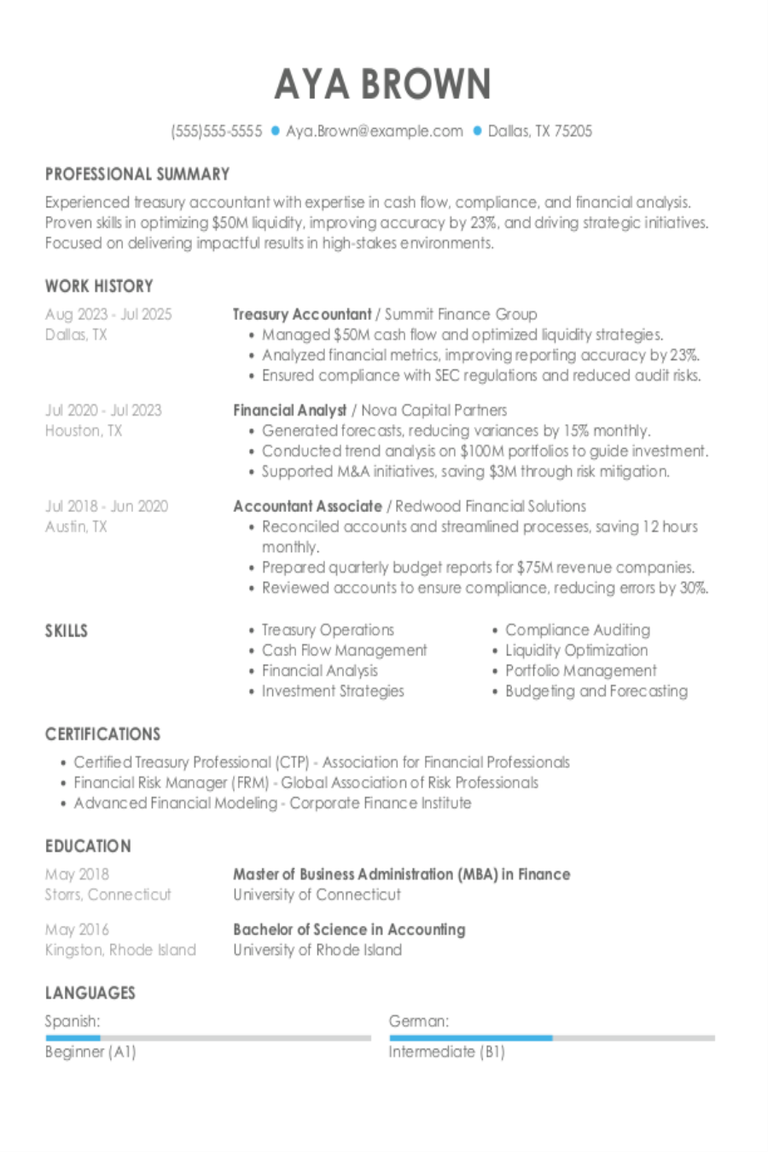
Treasury Accountant Resume Examples & Templates for 2025
Explore treasury accountant resume examples and learn how to show you handle cash flow, manage investments, and analyze financial data.Build my resumeImport existing resumeCustomize this templateWhy this resume worksQuantifies accomplishments: By
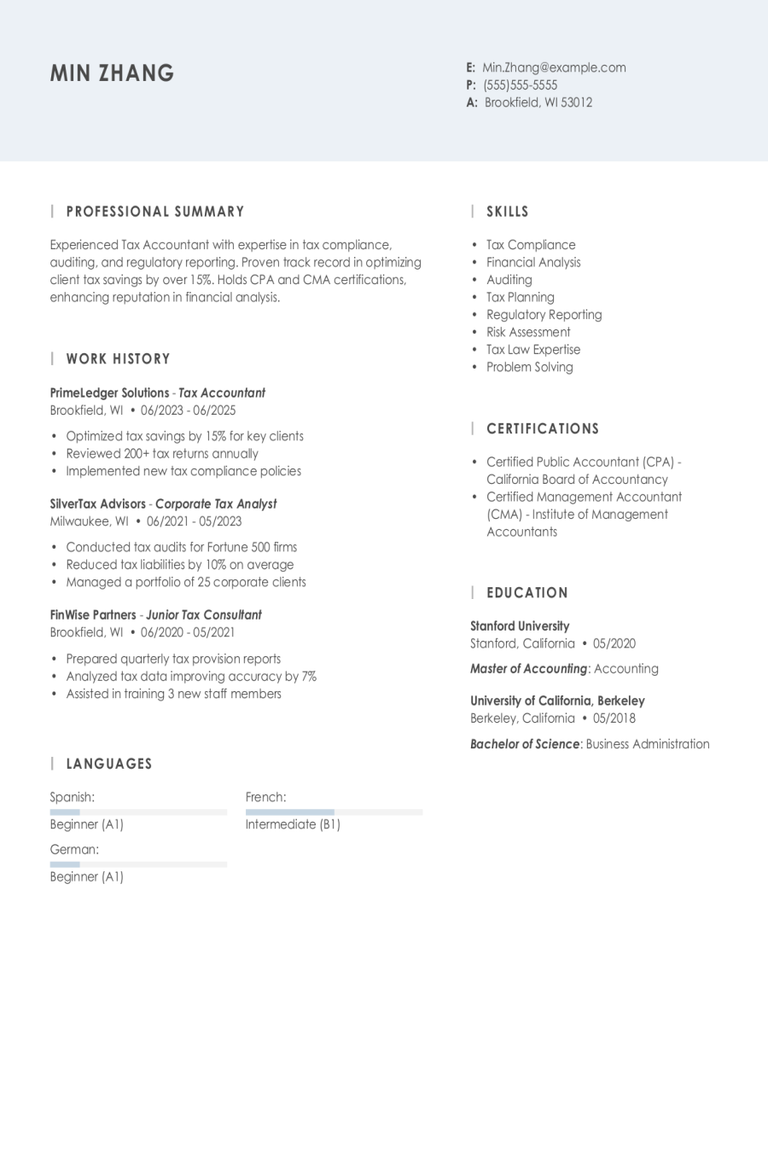
Tax Accountant Resume Examples & Templates for 2025
Explore tax accountant resume examples and tips to learn how to highlight your financial skills and tax expertise to stand out to potential employers in the accounting field.Build my resumeImport
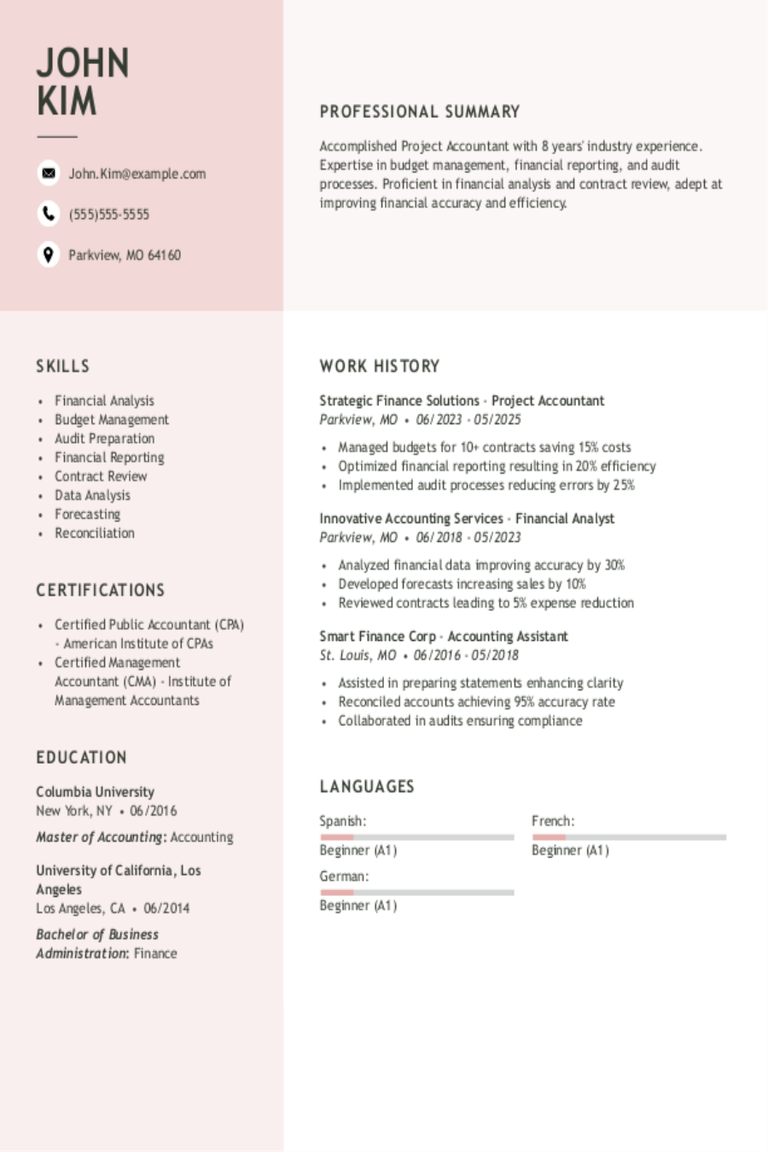
Project Accountant Resume Examples & Templates for 2025
Explore project accountant resume examples and tips to learn how to highlight your experience managing budgets and tracking financial progress.Build my resumeImport existing resumeCustomize this templateWhy this resume worksQuantifies
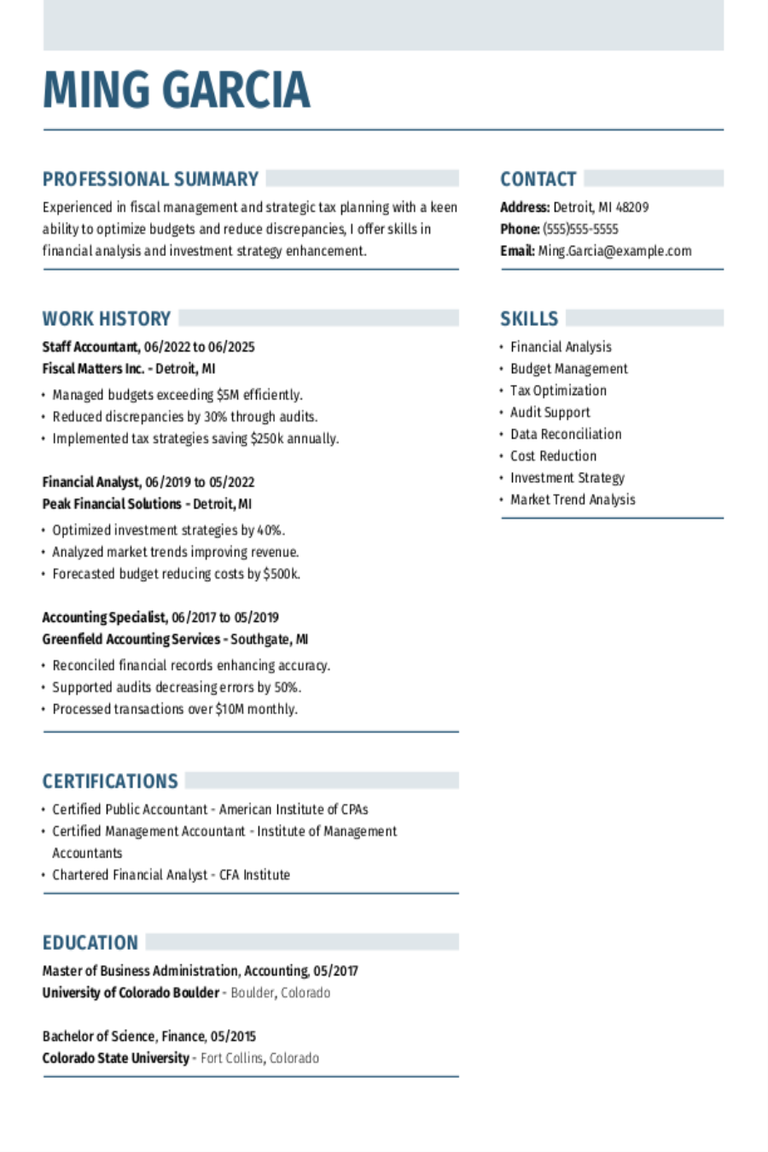
Staff Accountant Resume Examples & Templates for 2025
Explore staff accountant resume examples that demonstrate how to showcase financial skills and accounting experience. Get expert tips on how to highlight problem-solving abilities and attention to detail.Build my resumeImport
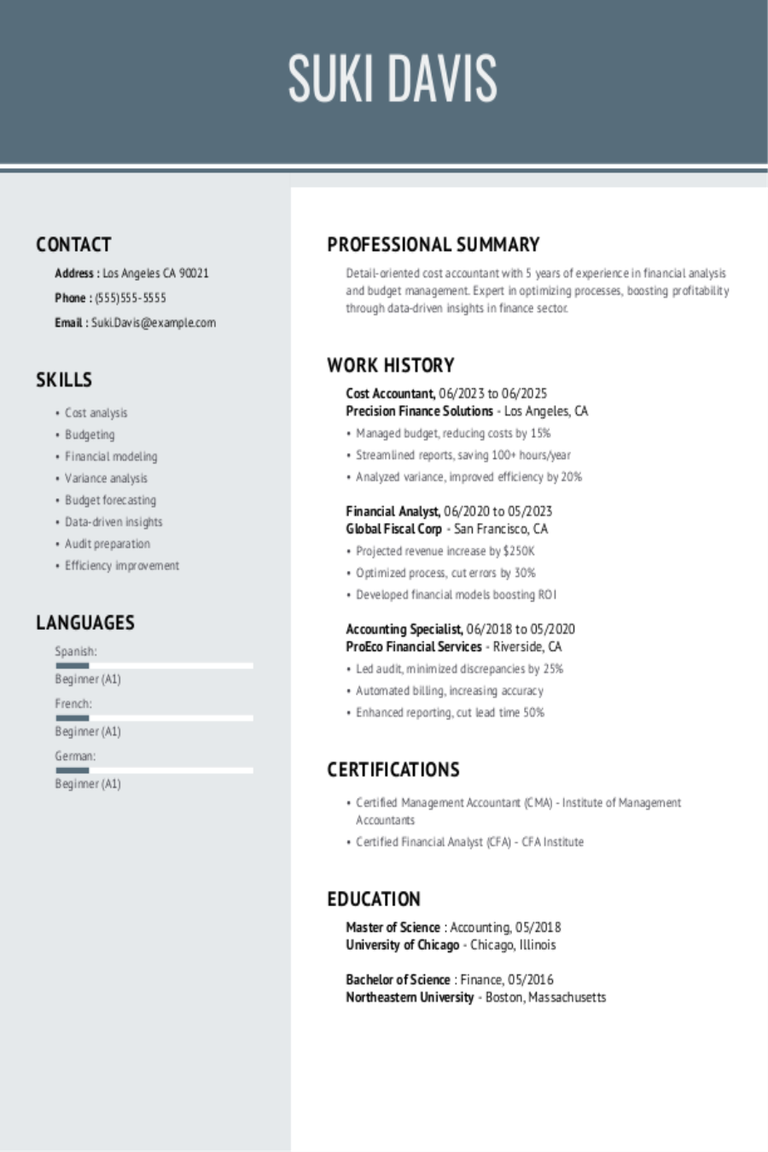
Cost Accountant Resume Examples & Templates for 2025
Explore cost accountant resume examples that focus on managing budgets and tracking expenses. Our tips will help you highlight your financial skills and show off your experience in handling company
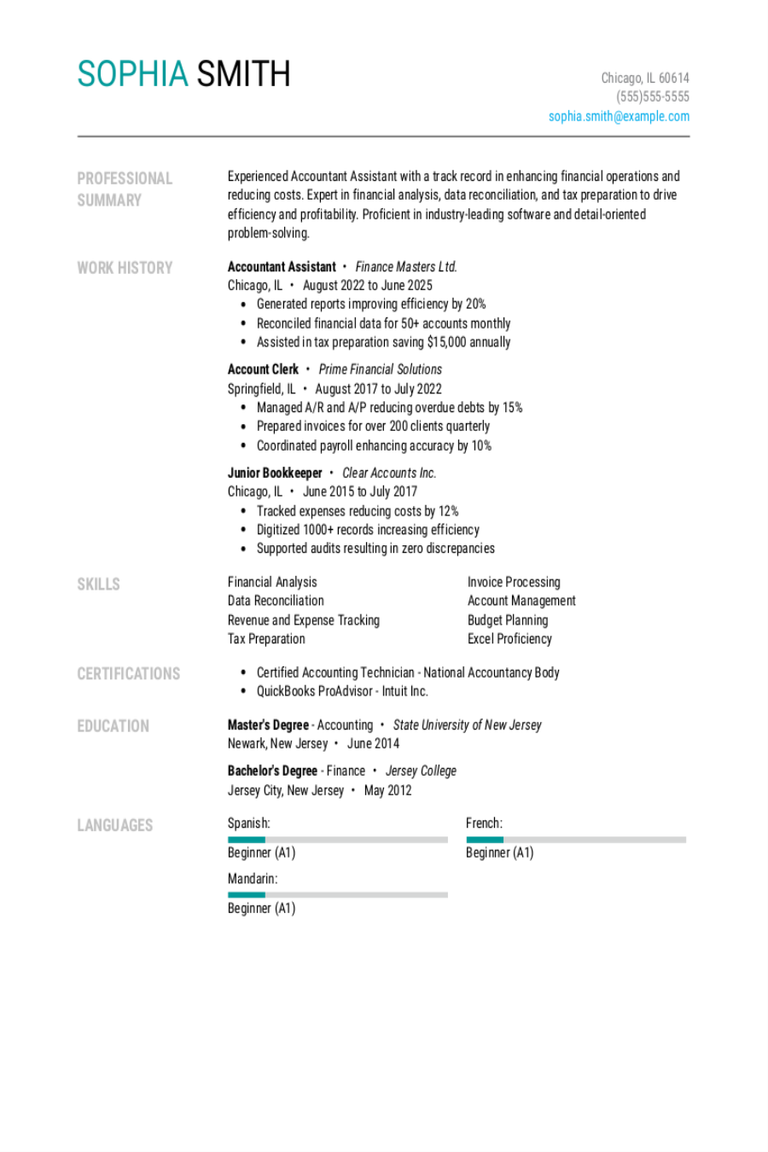
Accountant Assistant Resume Examples & Templates for 2025
Explore accountant assistant resume examples that focus on number skills, organizing documents, and helping with reports. Discover how to show you’re detail-oriented, good with numbers, and ready to support the
